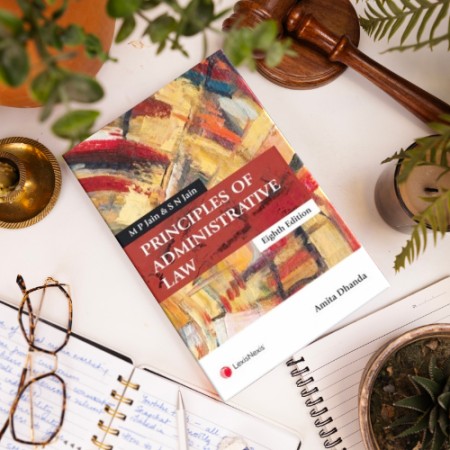
Preparing for the UPSC exam requires more than just memorizing facts, it demands a clear understanding of how power, governance, and accountability work. These top 10 Administrative Law books will help aspirants grasp the legal foundations that shape India’s administrative framework and public policy.

Public Interest Litigation Legal Aid and Lok Adalats
Dr. Mamta Rao’s Public Interest Litigation is a highly regarded work among practitioners and students alike. It highlights the judiciary’s effort to safeguard the individual’s right to file a PIL while tackling its growing misuse. The book also covers the Legal Services Authorities Act, aimed at promoting amicable dispute resolution. Extensively revised and updated, this edition includes recent judicial developments on public interest litigation, legal aid, and Lok Adalats, explained with clarity and precision.
Prashasanik Vidhi
The third edition of Administrative Law incorporates key amendments and the latest judicial decisions, reflecting the evolving role and expanding functions of the State. Translated into Hindi by K.N. Joshi from Justice C.K. Thakker (Takwani)’s Lectures on Administrative Law, it covers major rulings and new topics like the Consumer Protection Act, Writ Petitions, the Right to Information Act, and Lokpal and Lokayukta. This edition serves as a valuable guide for law students, advocates, and judicial officers.


Administrative Law
Administrative Law by Justice C.K. Thakker is a trusted and comprehensive work on key themes such as delegated legislation, natural justice, judicial review, and accountability of State action. The latest edition includes major Supreme Court rulings like Royer Mathew v. South Indian Bank Ltd., offering clear insights into evolving principles of fairness and governance. Combining constitutional depth with practical relevance, it serves as an essential guide for judges, lawyers, administrators, and students of law.
Lectures on Administrative Law
Lectures on Administrative Law by Justice C.K. Thakker (Takwani) remains one of the most trusted and widely read texts on the subject. The book explains core principles such as natural justice, judicial review, and remedies through an analytical study of case law. The eighth edition incorporates developments in Indian and international jurisprudence, including key Supreme Court rulings like Rajeev Suri v. DDA and State of Jharkhand v. Brahmputra Metallics Ltd. Updated with new topics and a ‘Suggested Readings’ section, this edition offers clarity, depth, and structured insights, making it indispensable for students, practitioners, and researchers of administrative law.


Administrative Law
The 10th edition offers an in-depth and updated analysis of administrative law, covering major judicial pronouncements and recent developments that strengthen procedural and substantive safeguards. It critically examines how administrative principles shape the relationship between the executive and citizens, with special focus on remedies. Written in simple language and enriched with key case law, discussion points, and suggested readings, this edition remains a comprehensive and accessible reference for students, lawyers, judges, government officials, and academicians.
Principles of Administrative Law
Jain and Jain’s Administrative Law, revised by Amita Dhanda, examines how India’s transition from a controlled to a liberalised economy has influenced the balance between administrative power and judicial oversight. Maintaining the classic blend of analysis and critique, this edition has been restructured around key principles such as delegated legislation, natural justice, and judicial remedies. With new chapters on bias and the auditing regime, and updates covering case law up to 2023, it offers a contemporary and insightful study of how judicial independence ensures executive accountability.


Public Interest Lawyering, Legal Aid and Para Legal Services
Public Interest Lawyering, Legal Aid and Para Legal Services by Kailash Rai offers a clear and practical understanding of law as a tool for social justice. It explains how public interest litigation, legal aid, and para-legal services help ensure access to justice for all, with detailed coverage of the Legal Services Authorities Act, 1987, and the role of Lok Adalats. This book is an essential guide for law students, practitioners, and those committed to public interest advocacy.
A to Z of Public Interest Litigation (PIL)
A to Z of Public Interest Litigation (PIL) by Pramod Kumar Singh offers a clear and concise overview of the evolution, scope, and procedure of PIL in India. It highlights landmark judgments, the role of the judiciary in promoting social justice, and the need to prevent misuse. Written in an accessible style, the book is a valuable resource for students, lawyers, and all those interested in public interest advocacy.


Administrative Law
Administrative Law by S.R. Myneni provides a clear and comprehensive explanation of the principles governing the functioning and control of administrative authorities in India. The book discusses key concepts such as delegated legislation, natural justice, judicial review, administrative discretion, and tribunals, supported by relevant case law. Designed in a simple and student-friendly manner, it bridges theoretical understanding with practical application, making it an essential text for law students, competitive exam aspirants, and anyone seeking to understand the structure and accountability of administrative processes.
Prashasnik Vidhi
Prashasnik Vidhi (Administrative Law in Hindi) by U.P.D. Kesari is a comprehensive and widely respected work that explains the principles and scope of administrative law in a clear and accessible manner. The book covers essential topics such as delegated legislation, principles of natural justice, administrative discretion, judicial control, and tribunals, along with important judicial decisions. Written in simple Hindi, it serves as an invaluable resource for Hindi-medium law students, competitive exam aspirants, and practitioners seeking a solid understanding of the structure and functioning of administrative authorities in India.

















